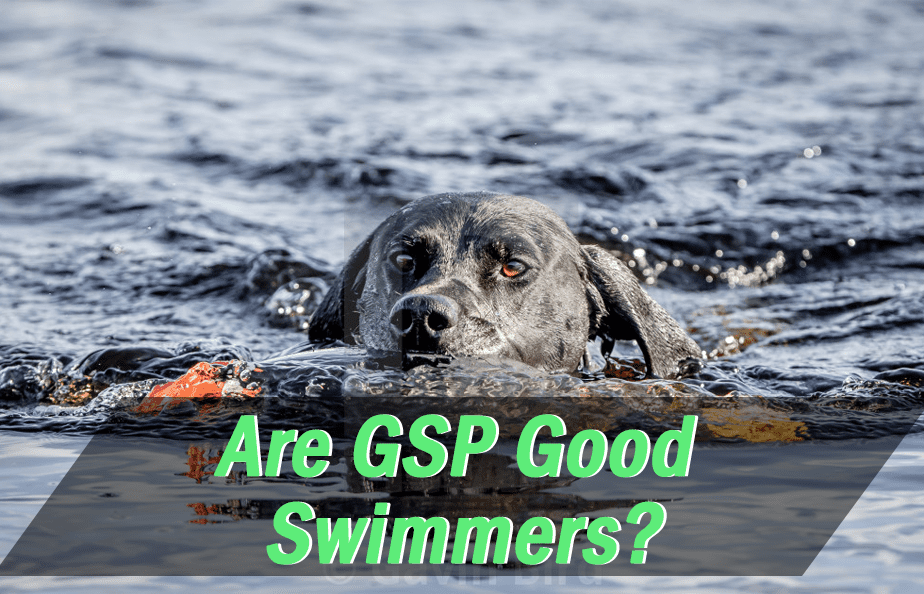Being outdoors and having a short dip in the lake nearby sounds great fun. Going on an adventure with your dog is even more fun because they are trusted and fun companions to take along anywhere.
However, if you’re on a hike and have to travel across a body of water, your dog may not react to water as you do. You never know what they will do or if they can even swim.
Many dog breeds swim very well, but some do not like being near water. It’s vital
for you to do your research to find out whether your dog is suited for conditions like this.
In this article, we shall have a look at whether GSPs are good swimmers or not, as well as discussions on some familiar topics like:
- Are Pointer Dogs good swimmers?
- Why shouldn’t you get a German Shorthaired Pointer?
- Which dog breed is the best swimmer?
- At what age do German Shorthaired Pointers calm down?
German Shorthaired Pointers have webbed feet and a short, water-resistant coat, and athletic traits with a strong and muscular build, so they are excellent swimmers. Since they were bred to hunt, swimming comes naturally to swim across shallow lakes or deep rivers to retrieve birds.

Are Pointer Dogs good swimmers?
Perhaps you’re a person who particularly likes water activities, such as boating, fishing, or simply swimming at the beach. Being a dog owner, you’d want your dog to be a part of almost every activity you do.
You may have heard of Pointer dogs, but they aren’t significantly known for swimming. However, they can also swim with incredible abilities. They are known for sniffing and pointing out prey. They are excellent as hunting and hiking partners.
Pointers are athletically built and have strong muscles; this helps them swim well. However, some of them may not be naturally good at it, requiring some training. However, you can determine whether your dog does well in water by introducing it to a safe and shallow water area.
Why shouldn’t you get a German Shorthaired Pointer?
You should adopt a German Shorthaired Pointer for several reasons. If you are a first-timer for owning dogs, they may be quite a lot to handle. But, there are several reasons why you shouldn’t.
Let’s begin with their constant need for attention when it comes to playtime and exercise. You need to commit your time and not be idle if you own a GSP dog. If you waste even a day, it can develop bad habits like destroying anything in sight simply due to boredom.
GSP is known for its energetic nature and constant active and lively character. These bursts of energy can be too much to handle sometimes. Unfortunately, they do not know the meaning of taking a nap. So they will resort to this foreign subject only when they’re sick or tired.
Apart from being hard to control, their separation anxiety can also get in the way when you’re leaving them alone. They get agitated and tear up or chew up anything in sight. If you’re gone for a long time, perhaps you can expect a mess when you return.
Which dog breed is the best swimmer?
There is an abundance of good swimmers when it comes to dogs. A few breeds, in particular, include the Poodle, Labrador Retriever, Newfoundland, Irish Setter, and so on. However, the dog breed considered the best swimmer is the Portuguese Water Dog.
PWDs are attracted to water that comes naturally, so it became a part of its official name. They like to swim so much that they enter any water body without being asked. They enthusiastically splash around, mastering the art of swimming without any problem.
Primarily bred for being a companion for fishermen, it is expected of the breed to be comfortable at the sight of boats, and you will see them hanging around on a boat with their owner.
Lately, as the hobby of fishing has dwindled, they have found several ways to use their swimming skills in activities like dock-diving and other water-related sports. The Portuguese Water Dog is an excellent fit for families who love doing water activities and spend their time on boats and yachts.
How do you get your GSP to like water?
You can try many things to help your German Shorthaired Pointer, like being in the water. It would help if you were not forceful when pushing your dog to perform activities such as this, as there may be some harmful effects.
If you want to begin training your dog to like water, start young, maybe at 9 weeks. Hold your dog in the water until it’s used to the feeling. It will then begin to kick and eventually start swimming.
Many dogs may not like the water at first, but it’ll be easier if you start when you are young. You can even try being in the water and calling your dog to you, and it will slowly follow.
You can even motivate it with food. Put some treats in the water and let them float while your dog drools, and eventually go in to get them without being told to.
Starting with these, you can move on to more fun things like having them chase you around or retrieve something in the water after they get comfortable. Once they take a liking to swim, there’s no turning back.
How does swimming benefit GSPs?
Several benefits emerge from activities like swimming for humans. Health experts back these benefits to say that swimming is beneficial to dogs too. Some benefits may include overall health improvements.
A minute of swimming burns calories and is enough exercise as 4 minutes of running. Using your muscles to swim and flap around in the water will strengthen organs like the heart and lungs, reduce inflammation, boost metabolism and even improve circulation.
Water-related activities like swimming are low-impact and non-concussive. This permits an overweight dog to enjoy the benefits of swimming without stressing their tendons and joints because how swimming does not bear weight. It helps with joint disorders like arthritis, dysplasia, etc.
It is excellent for physical health as much as it is for mental health, improving temperament. Just as humans need mental stimulation in many forms, dogs also need it to retain their happiness and intelligence. To keep your dog healthy and fight any physical issues that affect its health.
At what age do German Shorthaired Pointers calm down?
German Shorthaired Pointers are quite the energetic bunch. They are always on the move and are exhaustingly enthusiastic. Though they are pretty intelligent and fun to train, they can drain you because of their lively personality that constantly needs attention. It is fun but sometimes tiresome to have such a dog.
You need first to understand why it’s so hyper. The reasons maybe because they are initially a hunting breed, so they are often physically and mentally ready to pounce on anything. However, you need not worry, as GSPs tend to relax after turning two or three years old. While they are growing up as pups, they are born with many hyperactive traits, and they are not new to energetic bursts of energy and unruly mannerisms.
You can be lucky to have GSP dogs who calm down early in their lives, but some adults remain active and do not let go of their inner child, ready to run and play anywhere. Don’t count yourself as unlucky yet because you can still tame them with proper training. There are many exercises you can have them perform to manage their behavior.
How Do You Take Care Of Your German Shorthair Pointer During Swimming?
Once you’ve begun helping your dog like the water and become a good swimmer through training, there are numerous things you can do to support its swimming experience further to be both safe and fun.
Your GSP will probably get infections from swimming in their ears. Since their ears are big and floppy, the water can sit in the ear and act as a foundation for bacteria to form. You can avoid this by cleaning your GSPs ears and making sure it’s dry after a good swim.
You might like the idea of swimming in the pool or lake the whole day with the protection of your sunscreen but keep in mind that you may have to use the same on your dogs. There are some dog sunscreens that you can apply and reapply while having fun in the water. The GSPs’ short coats can get them easily sunburnt.
A dog owner’s worst enemy is the wet dog smell. There are also many pollutants in the water that can affect a dog’s health. So, it’s highly recommended that you bathe your dog after a swim. Hosing down your GSP with a bit of dog shampoo will eliminate the smell and eliminate any pollutants.
Final Thought
Despite your German Shorthaired Pointer’s inability to swim at first, it’ll ultimately learn how to with your help and patience. You can enjoy doing many water activities, hunting and retrieving targets, or simply exercising in the water. The GSP is an overall great companion to take along when swimming.

